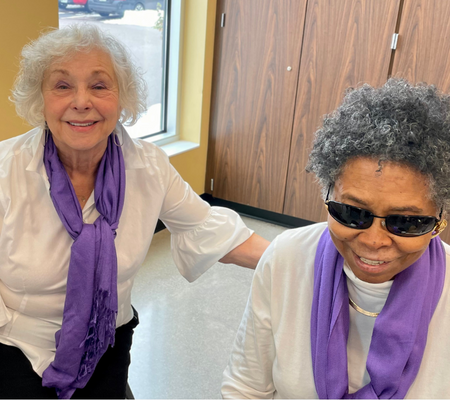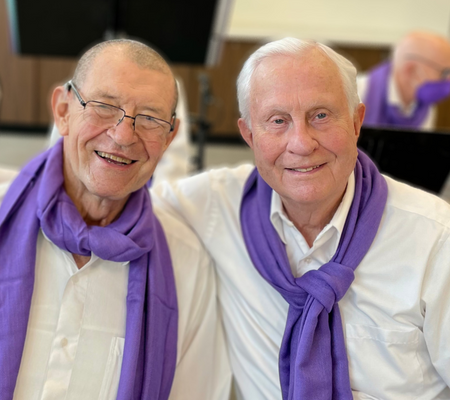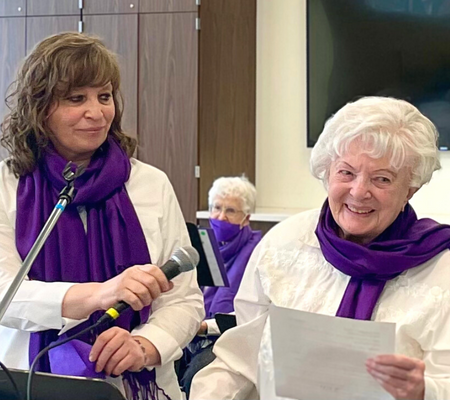Start a chorus for people living with dementia in your community
Thinking about starting a Giving Voice style chorus in your community? You’ve come to the right place!
Who can start a chorus?
Anyone!
You don’t have to be a choral director to start a chorus. Lots of people from different walks of life have started Giving Voice style choruses, from music therapists to church choir directors to community volunteers.
Why choruses for people with Alzheimer’s or other dementias?
When people are diagnosed with Alzheimer’s or other forms of dementia, they are often treated differently almost immediately.
The stigma of dementia is so strong, it can be hard to get a diagnosis at all. In fact, medical professionals are sometimes reluctant to share a diagnosis of dementia with their patients thinking, “what good will it do?”
And when they do get a diagnosis, they are told to go home and get their affairs in order.
But, there are some things that people living with dementia can do to help manage their symptoms.
Healthy lifestyles choices such as diet and exercise can help. Managing health conditions such as heart disease and diabetes can help because what’s good for the heart is good for the brain.
One of the easiest risk factors to manage is also one of the hardest.
Research has shown that social isolation, known to put people at risk for dementia, can accelerate the symptoms associated with dementia and is a significant health risk for all people with or without dementia.
When people are diagnosed with dementia, friends and family often fall away. People often make inaccurate assumptions about what people can and cannot do and what they can and cannot remember, even in the earlier stages of dementia.
While music cannot cure Alzheimer’s or other forms of dementia, music has all sorts of physical, mental, emotional, and social health benefits. And, while listening to music has benefits, those benefits increase when we make music. And, those benefits increase when we make music together.
With music, what’s good for the heart is good for the brain, and what’s good for the heart is also good for the soul.
What is a Giving Voice style chorus?
So, the people with dementia are the singers?
Yes! Giving Voice style choruses are made up of people living with dementia, their support partners (a friend or family member), and volunteers. The chorus is created for people living with dementia, but all chorus members are treated the same and share the same experience.
The chorus is designed so that all chorus members, including those with dementia, have the opportunity for successful participation.
People with dementia are full-fledge chorus members. They are not patients, and we do not identify who has dementia in any way. In fact, although we ask people to sign up with a partner, we don’t actually ask who has the dementia.
If you don’t ask about the dementia, how do you know who needs help?
We’ll be honest, most of the time we will hear from the caregiver who has dementia and some of the background about their situation. But, we don’t ask about the dementia because it’s not necessary.
Instead, we make sure to ask what would help new chorus members become a part of the chorus. We ask all new members if they would like some volunteer help.
We will often pair someone living with dementia with a volunteer to help ensure successful participation over the long term. The chorus member with dementia and the chorus member who is also a volunteer will stay together, sometimes for years, and get to know one another, developing mutual trust and respect.
Sometimes, though, when caregivers join the chorus, they also appreciate sitting with a volunteer. It’s a nice way to meet someone new and enjoy some respite while singing.
- Everyone is treated the same, so the experience is geared for everyone’s success, whether they have dementia or not. For example, everyone wears large font printed name tags that are designed to lie flat so everyone can call each other by name.
- In the chorus, “help” can mean different things. Sometimes, it’s the partner who needs help learning the music because they are new to singing. Sometimes, the person who has dementia may need some help navigating the structure of the rehearsal, but not always.
What if people aren’t musical or don’t know how to sing?
We believe that EVERYONE is a singer! We sing most songs (but not all) in three part harmony!
- Errorless learning, the experience of learning without worrying if you make a mistake, enables people with dementia (and really all of our chorus members) to learn the music by creating a non-threatening environment through positive feedback and repetition. “There is no wrong in this room!”
- People are seated by their capabilities. For example, people who need more help learning their vocal parts are seated with volunteers who are strong singers.
Do you sing the oldies? How do people with dementia learn the music?
We sing both familiar and unfamiliar songs. Of course, what’s familiar to one person isn’t necessarily familiar to another person, so “familiar” is variable.
Through errorless learning, structured rehearsals, a choral director and volunteers, and things like modified scores and practice tracks, people with dementia CAN learn new music.
And, if it’s not perfect, that’s okay. When we come together as a chorus, our voices modulate to match each other. That’s the secret sauce of a chorus, working together, singing together.
There’s magic in the air that binds us together and transforms us all into a community. When you are in a chorus, you belong.
What about the concert? People with dementia can actually learn the music and perform in a concert?
You betcha! And the concert is the best part. Giving Voice choruses are not sing-a-longs, and what makes it different is the concert. Our semesters are goal-oriented. We learn the repertoire each semester with the goal of performing for family and friends.
Music is a gift from our chorus to the community.
It’s a gift that shows everyone in the audience what’s possible when living with dementia. It’s life-affirming and life-changing for everyone involved, the singers and the audience.
Ready to get started? We invite you to join our worldwide movement!
We’ll be there for you. Starting with our toolkit, we’ll be there to guide you in launching and sustaining a chorus that changes lives and impacts your community.
If you’re thinking about starting a chorus, we would love to hear from you!
Let’s get started!
Stay connected.
Sign up for our GVI Choral Community Newsletter here, and we’ll keep you up to date on news, research, and events in our Choral Community.
Giving Voice and dementia choirs like ours are a place of joy, belonging, and purpose. Giving Voice choruses are created for people living with Alzheimer’s or another form of dementia and a care partner.



